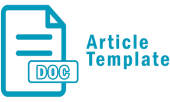Integrating Pancasila Ethics in Leadership in the VUCA Era
Abstract
The purpose of this research is to examine the urgency of Pancasila ethics in leadership in the VUCA era. This research is qualitative research with a literary approach. Researchers conducted a literature review of various literature based on keywords appropriate to the research study. The research steps are as follows: 1) Determining keywords based on the focus of the research study; 2) Search for literature via Google Scholar then reduce it, analyze it and draw conclusions according to the research focus. Leaders who have the Pancasila ethic will always adhere to the values of divinity, humanity, unity, people and social justice, which are universal values and are needed in every era, including in facing the current VUCA era. Integrating Pancasila leadership ethics in the VUCA era can include; a) integrating character education based on Pancasila values in every curricular and extracurricular learning; b) building leadership skills with project-based learning that is directly related to overcoming problems that occur in the community; c) cultivating digital citizenship literacy to build abilities in managing various information, so as to gain positive global insights and filter out negative impacts; d) Making the educational environment a democratic laboratory that promotes a space for self-actualization that is inclusive, collaborative and stimulates the development of various responsible leadership skills.
Keywords
Full Text:
PDFReferences
Adha, M. M., dan Susanto, E. (2020). Kekuatan nilai-nilai pancasila dalam membangun kepribadian masyarakat Indonesia. Al-Adabiya: Jurnal Kebudayaan dan Keagamaan, 15(01), 121-138.
Aribowo, H., dan Wirapraja, A. (2018). Strategi inovasi dalam rangka menjaga keberlanjutan bisnis dalam menghadapi era volatility, uncertainty, compelxity, dan ambiguity (vuca). Jurnal Ilmu Manajemen dan Akuntansi Terapan (JIMAT), 9(1), 51-58.
Budiharto, S., Himam, F., Riyono, B., dan Fahmi, A. (2019). Membangun konsep organisasi autentik. Kajian metaetnografi. Buletin Psikologi, 27(2), 159-172.
Firmansyah, A., dan Fahrani, N. S. (2019). Rencana suksesi pegawai negeri sipil di era vuca. Civil Service Journal, 13(2), 1-14.
Fridayani, J. A. (2021). Kepemimpinan adaptif dalam agilitas organisasi di era adaptasi kebiasaan baru. Modus, 33(2), 138-149.
Hulaimi, A., Sahri, S., dan Huzaini, M. (2017). Etika bisnis Islam dan dampaknya terhadap kesejahteraan pedagang sapi. JEBI (Jurnal Ekonomi dan Bisnis Islam), 2(1), 17-32.
Ibrahim, H. Z. (2015). Hakekat hukum pengupahan dalam upaya mewujudkan kesejahteraan sosial pekerja. Masalah-Masalah Hukum, 44(4), 431-446.
Khotimah, H. (2020). Penerapan pancasila perspektif Islam. Tahdzib Al-Akhlaq: Jurnal Pendidikan Islam, 3(2), 81-101.
Kirom, S. (2011). Filsafat ilmu dan arah pengembangan pancasila: Relevansinya dalam mengatasi persoalan kebangsaan. Jurnal Filsafat, 21(2), 99-117.
Manders, K. (2014). Leaders make the future: Ten new leadership skills for an uncertain world [review]/Johansen, Bob. Journal of Applied Christian Leadership, 8(1), 113-116.
Meutia, A. (2020). Dampak pandemi covid 19 pada psikis dan ingatan anak. Elementary School Journal PGSD FIP Unimed, 10(1), 60-66.
Mukhlisah, F. (2021). Pelatihan kepemimpinan smart governance: Adaptasi era vuca. Jurnal Analis Kebijakan, 5(2), 166-185.
Mulyadi, M., dan Prakoso, L. Y. (2021). Optimasi nilai-nilai pancasila di era vuca. Jurnal Inovasi Penelitian, 2(2), 415-426.
Permady, G. C., Zulfikar, G., Sulistiono, A., dan Laim, B. F. N. (2021). Pembentukan karakter kepemimpinan pancasila di politeknik pelayaran sorong (suatu telaah pada mata kuliah pendidikan pancasila). JPB: Jurnal Patria Bahari, 1(2), 35-45.
Putri, R. K., Sari, R. I., Wahyuningsih, R., Meikhati, E., dan Aji, A. W. (2021). Efek pandemi covid 19: dampak lonjakan angka phk terhadap penurunan perekonomian di Indonesia. Jurnal Bisnis Manajemen dan Akuntansi, 1(2), 72-77.
Rai, I. B., Sila, I. M., dan Dewi, I. A. C. (2022). Kepemimpinan wirausaha sinkretisme kepemimpinan pancasila dan kepemimpinan barat. Jurnal Pendidikan dan Konseling (JPDK), 4(5), 5089-5098.
Rath, C. R., Grosskopf, S., and Barmeyer, C. (2021). Leadership in the VUCA world-a systematic literature review and its link to intercultural competencies. European Journal of Cross-Cultural Competence and Management, 5(3), 195-219.
Setiawan, A., dan Fauzi, E. A. (2019). Etika kepemimpinan politik dalam penyelenggaraan pemerintahan Indonesia. Jurnal Pemerintahan dan Kebijakan (JPK), 1(1), 1-12.
Snyder, H. (2019). Literature review as a research methodology: An overview and guidelines. Journal of business research, 104 (C), 333-339.
Syamsurizal, S., Almaktsur, A., dan Dwi, S. R. (2023). Digital marketing dalam menghadapi volatility, uncertainty, complexity, dan ambiguity (VUCA). JAWI: Journal of Ahkam Wa Iqtishad, 1(3), 117-125.
Tanyid, M. (2014). Etika dalam Pendidikan : Kajian etis tentang krisis moral berdampak pada pendidikan. Jurnal Jaffray, 12(2), 235-250.
DOI: https://doi.org/10.17509/civicus.v23i2.63473
Refbacks
- There are currently no refbacks.
Copyright (c) 2023 JURNAL CIVICUS

This work is licensed under a Creative Commons Attribution-NonCommercial-ShareAlike 4.0 International License.
Our journal indexed by :
Jurnal Civicus is published Univesitas Pendidikan Indonesia in collaboration with Indonesia Association Profession of Pancasila and Civic Education/Asosiasi Profesi Pendidikan Pancasila dan Kewarganegaraan (AP3KnI).

Jurnal Civicus is licensed under a Creative Commons Attribution-NonCommercial-ShareAlike 4.0 International License.

.png)




__.png)










